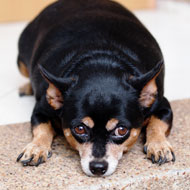Pet obesity: Are we doing a good job?

We should draw inspiration from the human field to help keep pets at their ideal weight
'Are we doing a good job as a profession when it comes to dealing with pet obesity?' asked veterinary surgeon Alex German at London Vet Show last week (17-18 November).
He argued that obesity is a chronic disease, quoting Kopelman, who, when referring to obesity said it was: "A disease in which excessive body fat has accumulated such that health may be adversely affected".
Obesity has complex causes; there are many risk factors associated with overweight conditions, including functional impairment. The speaker described it as a long illness that cannot be cured.
He illustrated his case by referring to a real case – Beryl and her overweight dog Bruce.
His message was that despite all the good intentions of owners, the overwhelming majority of treatment for obesity cases fail. The usual scenario is of initial weight loss but after three months' compliance with the diet it fails. Only half the individuals who start on a weight loss programme finish and half of the pets who do finish subsequently regain weight.
Most obese dogs are never even put on a weight loss programme; in a monitored study of 21,000 consultations involving overweight pets, only 1.4 per cent of vets actually wrote the pet down in their notes as being overweight. This would suggest very strongly that the veterinary profession is currently very apathetic to obesity.
One of the answers, Dr German said, is to focus on prevention rather than cure by trying to spot animals before obesity occurs, promoting healthier lifestyles and proactively monitoring weight status for lifestyle.
He suggested that pet obesity has great parallels with human obesity and that we should draw inspiration from the human field to help keep pets at their ideal weight. He stressed the importance of paying attention to a pet's food intake and activity and the need to monitor weight on a regular basis, i.e. every three months for senior pets and every six months for adult pets, as well as at each consultation for every pet. He also suggested complementing weight checks with body condition scoring.
There is, as always, an elephant in the room and in this case it is the owner themselves.
While human obesity is acceptable it is very difficult to address pet obesity, particularly if the owners of the obese pets are themselves very overweight. There is a reluctance to address the obesity issue head on, just as there is with the condition in the human field. We don't do this with other diseases; we are happy to say your dog has diabetes, so rather than saying your dog is a little heavy or your dog is obese, we should be saying your dog has obesity, i.e it has a disease and the disease is obesity.
It may be too late to cure the present generation of obese pets going by the limited success of current and traditional weight programmes, but we can look to the future and put in place preventative measures for the next generation.



 The latest
The latest